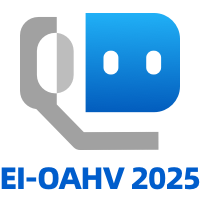Zhuhai, China
2026 Greater Bay Area Forum on Embodied Intelligence:
Optical Advances in HCI and VR
Welcome to EI-OAHV 2026
The 2026 Greater Bay Area Forum on Embodied Intelligence: Optical Advances in HCI and VR (EI-OAHV 2026) will be held from January 16-18, 2026, in Zhuhai, Guangdong, China. The forum is hosted by the Macao Technology and Cultural Exchange Association and the Zhuhai Computer Federation, bringing together researchers, engineers, and industry experts to explore emerging developments at the intersection of optical engineering, intelligent systems, and immersive technologies.
This conference focuses on the engineering and application aspects of optical and intelligent systems in Human–Computer Interaction (HCI) and Virtual and Augmented Reality (VR/AR). Topics include optical sensing and imaging, AI-driven tracking and perception, computational and adaptive optics, wearable and near-eye devices, system calibration and 3D reconstruction, and cross-modal interaction technologies for intelligent and immersive experiences.
By fostering collaboration among experts in optics, intelligent systems, computer vision, and engineering design, the 2025 Greater Bay Area Forum aims to promote transdisciplinary innovation and advance next-generation interaction technologies that enhance how humans perceive, interact, and engage with virtual and augmented environments in the era of embodied intelligence.
Main session
20th International Conference on Virtual Reality Continuum and its Applications (VRCAI 2025)
VRCAI 2025 will be held from December 13-14 in Macau, China, hosted by the Macau University of Science and Technology.
Conference Website: https://vrcai.cn/
Full Paper Submission Date
December 31, 2025
Registration Date
January 5, 2026
Final Paper Submission Date
January 9, 2026
Conference Dates
January 16-18, 2026
Submission
All submissions will undergo a double-blind peer review by 2-3 experts in relevant fields. Acceptance will be based on the quality of the paper and satisfactory revisions in response to reviewers’ comments. Accepted papers, following proper registration and presentation, will be included in the conference proceedings and submitted for indexing in EI Compendex and Scopus.
Call for Papers
Topics are included but not limited to the following:
Optical and Intelligent Interaction Systems
Optical sensing and imaging for gesture and motion recognition
AI-driven tracking and perception for human–computer interactio
Computational optics and data fusion for adaptive interfaces
Wearable and near-eye optical systems for interactive experiences
Intelligent photonic sensors and embedded optical devices
Human factors and usability in optical interaction design
Integration of optical, electronic, and AI technologies in smart systems
Applications of optical technologies in embodied and cognitive interaction
Engineering Applications in VR/AR
Optical and mechanical design for VR/AR/MR devices
Real-time rendering and computational imaging for immersive visualization
Depth sensing, calibration, and 3D reconstruction technologies
Smart materials and photonic components for lightweight display systems
System integration and optimization for immersive hardware and software
AI-enhanced scene understanding and interaction in virtual environments
Evaluation methods for optical performance and user experience
Cross-disciplinary applications of VR/AR in education, healthcare, and engineering
Sponsored by

Zhuhai Computer Federation

